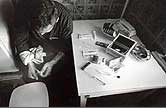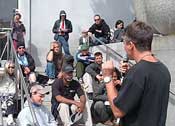Feature Archives
Mon Nov 1 2004
Marijuana: Cure for Brain Cancer?
U.S. corporate media has, according to Marin's Coastal Post, ignored yet another report that marijuana components can inhibit cancer growth. Cancer Research, the journal of the American Association for Cancer Research (AACR), has published [PDF] results of clinical research demonstrating that marijuana's components can inhibit the growth of cancerous brain tumors. The Spanish study, heralded in an August AACR press release, is the latest in a long line of studies, originally initiated by the U.S. government decades ago, demonstrating the potential of cannabinoids as anti-cancer agents. Full story
Mon Nov 1 2004
Marijuana Arrests For 2003 Hit Record High
Police arrested an estimated 755,187 persons for marijuana violations in 2003, according to the Federal Bureau of Investigation's annual Uniform Crime Report. The total is the highest ever recorded by the FBI, and comprised 45 percent of all drug arrests in the United States. According to NORML, this "tremendous waste of criminal justice resources" costs taxpayers approximately $7.6 billion annually. Full Story
Oakland's Measure Z was passed; Berkeley's Measure R was not passed.
11/1/2004: Voters in Oakland and Berkeley this fall have opportunities to affect medical marijuana users in their communities by affecting licensing or permitting of cannabis dispensaries.
Oakland's Measure Z would make private adult cannabis offenses the lowest priority for Oakland police. It would direct the city to support changes in public policy to allow licensing, sale, and regulation of marijuana for private adult use. The purpose of this ordinance, proponents say, is to reduce law enforcement costs, eliminate criminal traffickers, keep cannabis off the streets and away from children, raise much-needed revenue for the city, and advocate for sensible changes to cannabis law at the state level, and other levels of government as necessary. Measure Z was endorsed by Barbara Lee.
Berkeley's Measure R would have required the city to issue permits for medical marijuana dispensaries, and remove fixed limits on the amount of medical marijuana patients and caregivers can possess. By eliminating a requirement that medical marijuana dispensaries in the city get a use permit, Measure R would allow them to open anywhere permitted by zoning laws. Under current law, dispensaries for medical marijuana are required to go through a long process to obtain permits, including a public hearing. This has proved difficult for a dispensary that wanted to move their location. The city recently voted to restrict the number of clubs in Berkeley to the three that are currently in operation. Daily Cal article about Measure R | Berkeley Voice article about limited number of pot clubs in Berkeley
Salon's Drug War Rant National 2004 Voting Guide
11/1/2004: Voters in Oakland and Berkeley this fall have opportunities to affect medical marijuana users in their communities by affecting licensing or permitting of cannabis dispensaries.
Oakland's Measure Z would make private adult cannabis offenses the lowest priority for Oakland police. It would direct the city to support changes in public policy to allow licensing, sale, and regulation of marijuana for private adult use. The purpose of this ordinance, proponents say, is to reduce law enforcement costs, eliminate criminal traffickers, keep cannabis off the streets and away from children, raise much-needed revenue for the city, and advocate for sensible changes to cannabis law at the state level, and other levels of government as necessary. Measure Z was endorsed by Barbara Lee.
Berkeley's Measure R would have required the city to issue permits for medical marijuana dispensaries, and remove fixed limits on the amount of medical marijuana patients and caregivers can possess. By eliminating a requirement that medical marijuana dispensaries in the city get a use permit, Measure R would allow them to open anywhere permitted by zoning laws. Under current law, dispensaries for medical marijuana are required to go through a long process to obtain permits, including a public hearing. This has proved difficult for a dispensary that wanted to move their location. The city recently voted to restrict the number of clubs in Berkeley to the three that are currently in operation. Daily Cal article about Measure R | Berkeley Voice article about limited number of pot clubs in Berkeley
Salon's Drug War Rant National 2004 Voting Guide
Sat Oct 30 2004
5th National Harm Reduction Conference
The 5th National Harm Reduction Conference was held from November 11th through 14th, 2004 in New Orleans, Louisiana. Harm reduction is "a set of practical strategies that reduce negative consequences of drug use, incorporating a spectrum of strategies from safer use, to managed use to abstinence." Read more.
The goals of the conference are to:
- Provide a safe forum for the exchange of information, ideas, and strategies for incorporating harm reduction into direct services, public policy, and individual lives
- Offer technical information on program development and implementation
- Present current examples of effective harm reduction services and policies
- Encourage a dialogue between individuals from diverse disciplines, backgrounds, and personal experiences, including drug users and those with a history of drug use
- Explore and analyze our own attitudes about and relationships to drugs and drug users
- Exchange and develop practical skills community organizing
- Facilitate local, regional, and national networks and develop plans of action
Thu Oct 7 2004
Bush Administration Chooses Not to Appeal Decision in About Sale and Consumption of Hemp Foods
On February 6, 2004, a three judge federal panel ruled unanimously that hemp foods are legal and safe to consume. Manufacturers and consumers of nutritious hemp food products are were quite pleased, but they had to wait to find out if they had really won the legal battle. On June 28th, the U.S. Court of Appeals for the Ninth Circuit denied the Drug Enforcement Administration's (DEA's) petition for an En Banc rehearing, which allowed the Bush Administration until September 26th to appeal to the Supreme Court. By September 28th, it had become clear that the Bush Administration would not appeal the Ninth Circuit Court of Appeals' February 6, 2004 decision in the Hemp Industries Association, et al v. DEA case. Three years after the Drug Enforcement Administration (DEA) issued a rule purporting to ban hemp food products, that law was clearly revoked..
"Removing the cloud the DEA put into the marketplace will spur a dramatic surge in the supply and consumption of healthy omega-3 rich hemp seed in America," says David Bronner, Chair of the HIA's Food and Oil Committee and President of Alpsnack/Dr. Bronner's Magic Soaps. "This is a huge victory for the hemp industry. The Bush Administration decision not to appeal the Ninth Circuit's decision from earlier this year means the three-year-old legal battle over hemp seed products is finally over. The three-judge panel in the Ninth Circuit unanimously ruled that the DEA ignored the specific Congressional exemption in the Controlled Substances Act (CSA) that excludes hemp fiber, seed and oil from control along with poppy seeds. The Court viewed as insignificant and irrelevant harmless trace amounts of THC in hemp seed, just like harmless trace amounts of opiates in poppy seeds."
Alexis Baden-Mayer, Director of Government Affairs for Vote Hemp, says, "Right now the U.S. marketplace is supplied by hemp seed grown and processed in Canada and Europe. We will now work to convince Congress it is time for the U.S. to again allow American farmers to grow industrial hemp and participate in this lucrative growth market." Read more
Hemp Industries Association will be having a conference ($$$) in SF from November 3rd through 5th | More Hemp news and studies | New Farm article | Cannabis Culture Article | TestPledge | Organic Consumers Association
"Removing the cloud the DEA put into the marketplace will spur a dramatic surge in the supply and consumption of healthy omega-3 rich hemp seed in America," says David Bronner, Chair of the HIA's Food and Oil Committee and President of Alpsnack/Dr. Bronner's Magic Soaps. "This is a huge victory for the hemp industry. The Bush Administration decision not to appeal the Ninth Circuit's decision from earlier this year means the three-year-old legal battle over hemp seed products is finally over. The three-judge panel in the Ninth Circuit unanimously ruled that the DEA ignored the specific Congressional exemption in the Controlled Substances Act (CSA) that excludes hemp fiber, seed and oil from control along with poppy seeds. The Court viewed as insignificant and irrelevant harmless trace amounts of THC in hemp seed, just like harmless trace amounts of opiates in poppy seeds."
Alexis Baden-Mayer, Director of Government Affairs for Vote Hemp, says, "Right now the U.S. marketplace is supplied by hemp seed grown and processed in Canada and Europe. We will now work to convince Congress it is time for the U.S. to again allow American farmers to grow industrial hemp and participate in this lucrative growth market." Read more
Hemp Industries Association will be having a conference ($$$) in SF from November 3rd through 5th | More Hemp news and studies | New Farm article | Cannabis Culture Article | TestPledge | Organic Consumers Association
Sat Oct 2 2004
Medical Cannabis Legal Clinic
Oct 1, 2004: Indybay reporter Freeman reports that seventy-five patients gathered on the steps of San Francisco's Hall of Justice today for a free Medical Cannabis Legal Clinic to hear the latest information from J. Tony Serra, Dennis Peron, Bill Panzer, Dale Gieringer of California NORML, Eddy Lepp, Tony Bowles, Bruce Mirken, Camilla Field of the Drug Policy Alliance, Tom the nurse, and other notable speakers in the medical cannabis community. Some of the topics addressed were: obtaining a physician's recommendation, providing an affirmative defense, what to do in a police encounter, the nuts and bolts of SB 420, establishing local medical cannabis guidelines, patient-doctor confidentiality, organizing trial support for defendants, and fighting asset forfeiture hearings.
The Medical Cannabis Legal Clinic was the inaugural project of the proposed Cannabis Defense Clinic, a project planned to provided legal advice and representation to marijuana defendants in the event that may seek a jury trial. Report and Photos More info at HempEvolution's website
The Medical Cannabis Legal Clinic was the inaugural project of the proposed Cannabis Defense Clinic, a project planned to provided legal advice and representation to marijuana defendants in the event that may seek a jury trial. Report and Photos More info at HempEvolution's website
Fri Sep 3 2004
DEA Raid in Roseville, CA
On September 3rd, federal agents raided one of the Sacramento area’s only licensed medical marijuana dispensaries- Capitol Compassionate Care, in Roseville. CCC has approximately 1,000 registered patients. It was shut down in a Drug Enforcement Agency action that also included the home of the center’s owner in nearby Newcastle.
Drug War:
 24
24






